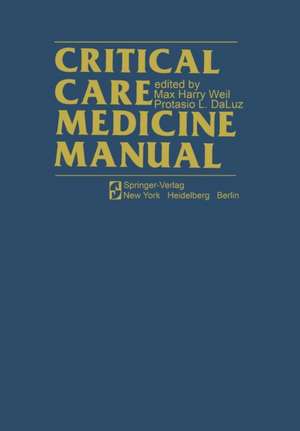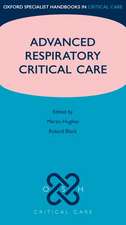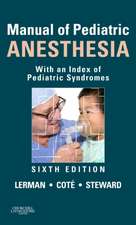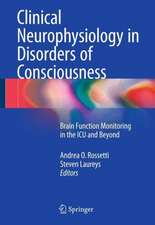Critical Care Medicine Manual
Editat de M. H. Weil, P. L. DaLuzen Limba Engleză Paperback – 26 noi 2012
Preț: 724.14 lei
Preț vechi: 762.26 lei
-5% Nou
Puncte Express: 1086
Preț estimativ în valută:
138.58€ • 144.50$ • 115.17£
138.58€ • 144.50$ • 115.17£
Carte tipărită la comandă
Livrare economică 21 martie-04 aprilie
Preluare comenzi: 021 569.72.76
Specificații
ISBN-13: 9781461299349
ISBN-10: 1461299349
Pagini: 396
Ilustrații: XXIV, 371 p. 57 illus.
Dimensiuni: 170 x 244 x 21 mm
Greutate: 0.63 kg
Ediția:Softcover reprint of the original 1st ed. 1978
Editura: Springer
Colecția Springer
Locul publicării:New York, NY, United States
ISBN-10: 1461299349
Pagini: 396
Ilustrații: XXIV, 371 p. 57 illus.
Dimensiuni: 170 x 244 x 21 mm
Greutate: 0.63 kg
Ediția:Softcover reprint of the original 1st ed. 1978
Editura: Springer
Colecția Springer
Locul publicării:New York, NY, United States
Public țintă
ResearchCuprins
I. Respiratory Crises.- Respiratory Monitoring.- Management of Acute Hypoxia and Hypercarbia in the Patient with Advanced Obstructive Airway Disease.- Humidification, Nebulization, and Bronchodilator Agents.- Acute Respiratory Failure in the Critically Ill: “Shock Lung”.- Mechanical Ventilators: Critical Assessment and Methods of Use.- Weaning from Mechanical Ventilation.- Management of Flail Chest.- Diagnosis and Treatment of Acute Pulmonary Thromboembolism and Fat Emboli.- II. Shock and Trauma.- Treatment of Shock and Trauma States: Use of Cardiorespiratory Patterns to Define Therapeutic Goals, Predict Survival, and Titrate Therapy.- Prognostic Indices as a Basis for Assessing Severity of Shock.- Disseminated Intravascular Coagulation.- Principles of Fluid Challenge for Routine Treatment of Shock.- The Diagnosis and Treatment of Anaphylactic Shock.- Indications for Use of Corticosteroid Agents in Treatment of Shock.- Hemodynamic Defects Underlying Shock with Indications for Treatment: An Appraisal of Vasopressors and Vasodilators.- III. Neurologic Crises and Opportunistic Infections.- Brain Monitoring and Homeostasis in Comatose, Critically Ill Patients.- Neurologic Monitoring.- Opportunistic Infections in Critical Care Units.- IV. Cardiovascular Crises.- The Relationship of Pulmonary Edema to Hydrostatic and Colloid Osmotic Pressures in Man.- Indications for and Use of Flow-directed Catheters for Diagnosis and Treatment.- Indications for the Treatment of Myocardial Infarcation with Corticosteroids.- Avoiding Emergencies in the Pregnant Patient with Heart Disease.- Sudden Death and Acute Myocardial Infarction—What Are We Talking About?.- Potentially Fatal Ventricular Arrhythmias.- Techniques for Establishing Appropriate Dose Regimens of Digitalis.- Tissue BloodFlow and Oxygen Transport in Critically Ill Patients.- Influence of Pharmacologic Agents on Tissue Metabolism in Circulatory Shock.- Cardiopulmonary Emergencies in the Newborn.- Impedance Reduction in Therapy of Power Failure of the Heart.- V. Renal and Metabolic Crises.- Acute Life-threatening Fluid and Electrolyte Abnormalities.- Metabolic Causes of Arrhythmias in the Critically Ill Patient.- Nutrition of the Critically Ill and Traumatized Patient: Parenteral Alimentation.- Metabolic Crises in the Neonate: Thermoregulation and Hypoglycemia.- VI. Planning and Operations.- The “Stat” Laboratory.- Bedside Automation for the Critically Ill Patient.- Electrical Safety.- The Ethics of Sustaining Life in the Infirm Aged and Critically Ill.- Psychopharmacologic Management of Psychiatric Syndromes in the Critically Ill.










